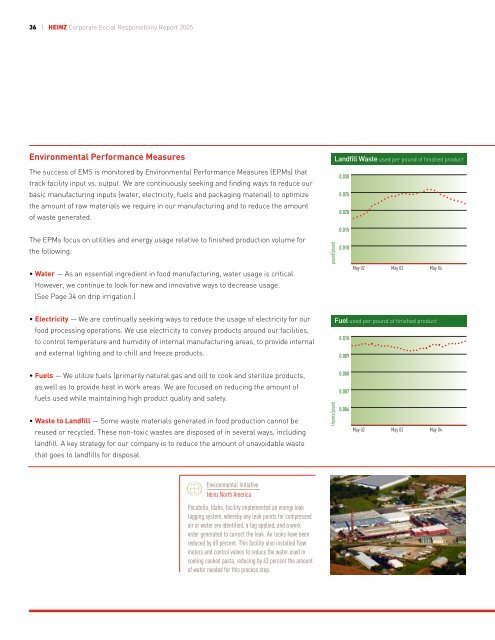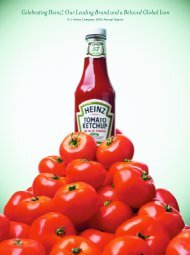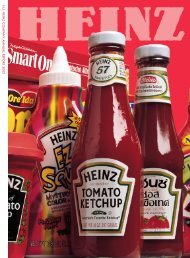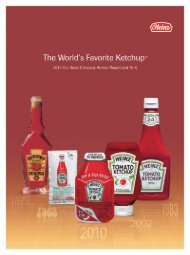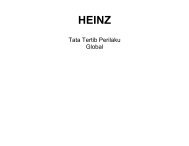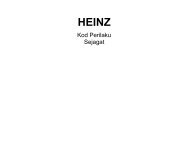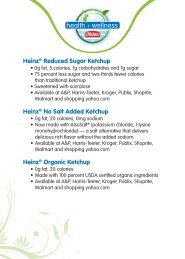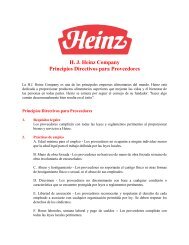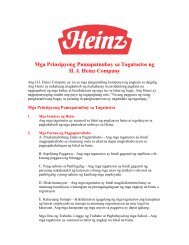GOOD FOOD, EVERY DAYâ„¢ H.J. Heinz Company
GOOD FOOD, EVERY DAYâ„¢ H.J. Heinz Company
GOOD FOOD, EVERY DAYâ„¢ H.J. Heinz Company
Create successful ePaper yourself
Turn your PDF publications into a flip-book with our unique Google optimized e-Paper software.
36 | HEINZ Corporate Social Responsibility Report 2005<br />
Environmental Performance Measures<br />
The success of EMS is monitored by Environmental Performance Measures (EPMs) that<br />
track facility input vs. output. We are continuously seeking and finding ways to reduce our<br />
basic manufacturing inputs (water, electricity, fuels and packaging material) to optimize<br />
the amount of raw materials we require in our manufacturing and to reduce the amount<br />
of waste generated.<br />
The EPMs focus on utilities and energy usage relative to finished production volume for<br />
the following:<br />
• Water — As an essential ingredient in food manufacturing, water usage is critical.<br />
However, we continue to look for new and innovative ways to decrease usage.<br />
(See Page 34 on drip irrigation.)<br />
• Electricity — We are continually seeking ways to reduce the usage of electricity for our<br />
food processing operations. We use electricity to convey products around our facilities,<br />
to control temperature and humidity of internal manufacturing areas, to provide internal<br />
and external lighting and to chill and freeze products.<br />
• Fuels — We utilize fuels (primarily natural gas and oil) to cook and sterilize products,<br />
as well as to provide heat in work areas. We are focused on reducing the amount of<br />
fuels used while maintaining high product quality and safety.<br />
• Waste to Landfill — Some waste materials generated in food production cannot be<br />
reused or recycled. These non-toxic wastes are disposed of in several ways, including<br />
landfill. A key strategy for our company is to reduce the amount of unavoidable waste<br />
that goes to landfills for disposal.<br />
Environmental Initiative<br />
<strong>Heinz</strong> North America<br />
Pocatello, Idaho, facility implemented an energy leak<br />
tagging system, whereby any leak points for compressed<br />
air or water are identified, a tag applied, and a work<br />
order generated to correct the leak. Air leaks have been<br />
reduced by 60 percent. This facility also installed flow<br />
meters and control valves to reduce the water used in<br />
cooling cooked pasta, reducing by 43 percent the amount<br />
of water needed for this process step.<br />
therms/pound Fuel used per pound of finished product<br />
0.030<br />
0.025<br />
0.020<br />
0.015<br />
0.010<br />
May 02<br />
May 03<br />
May 04<br />
pound/pound Landfill Waste used per pound of finished product<br />
0.010<br />
0.009<br />
0.008<br />
0.007<br />
0.006<br />
0.005<br />
May 02<br />
May 03<br />
May 04


